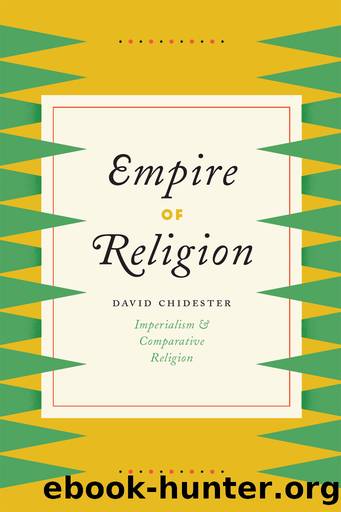Empire of Religion by David Chidester;

Author:David Chidester; [Chidester, David]
Language: eng
Format: epub
Publisher: University of Chicago Press
Published: 2014-11-15T00:00:00+00:00
CHAPTER SEVEN
Humanity and Divinity
The idea of the âbarbarous Negroâ is a European invention.
LEO FROBENIUS
In Souls of Black Folk, published in 1903, W. E. B. Du Bois (1868â1963) insisted that the religious life of African Americans did not begin in America, because it was built on âdefinite historical foundations,â the religious heritage of Africa. Characterizing indigenous African religion as ânature worship,â with its incantations, sacrifices, and attention to good and evil spiritual influences, Du Bois invoked the African priest as both the guardian of African religious tradition and the mediator of religious change under slavery in America. As a result of colonization, passage, and enslavement, African social formations were destroyed, âyet some traces were retained of the former group life,â Du Bois observed, âand the chief remaining institution was the Priest or Medicine-man.â With the destruction of established African social relations of kinship and political sovereignty, which bore their own religious significance in Africa, the African priest represented a relatively mobile, transportable focus of religious life. Assuming multiple roles, operating as bard, physician, judge, and priest, the African ritual specialist âearly appeared on the plantation and found his function as the healer of the sick, the interpreter of the Unknown, the comforter of the sorrowing, the supernatural avenger of wrong, and the one who rudely but picturesquely expressed the longing, disappointment, and resentment of a stolen and oppressed people.â1 In these evocative terms, Du Bois recalled the creativity of the African priest, who deployed indigenous African religious resources under radically altered conditions.
Although the religion of the African priest came to be known by different names, such as âVoodooismâ (Vodou) or âObe Worshipâ (Obeah), Du Bois provocatively proposed that another name eventually adopted in America for indigenous African religion was âChristianity.â Within the limits of the slave system, but also within the space opened by the African priest, ârose the Negro preacher, and under him the first Afro-American institution, the Negro Church.â According to Du Bois, this church, in the first instance, was not Christian but African, since it only placed a âveneer of Christianityâ upon the ongoing adaptation of indigenous African beliefs and practices under slavery. Suggesting that the Christianization of indigenous African religion should be regarded as a gradual process of religious transformation, Du Bois observed that âafter the lapse of many generations the Negro church became Christian.â In reviewing the âfaith of the fathersâ in Souls of Black Folk, Du Bois sought to establish a basic continuity in religious life from Africa to African America. The âstudy of Negro religion,â he insisted, had to carefully track a transatlantic process of religious development âthrough its gradual changes from the heathenism of the Gold Coast to the institutional Negro Church of Chicago,â which began with indigenous African religion.2
Among his many interests, Du Bois was an African historian. During the long course of his life, he took up the challenge of providing general historical overviews of Africa and the African diaspora in five books, The Negro (1915), Africa: Its Place in Modern
Download
This site does not store any files on its server. We only index and link to content provided by other sites. Please contact the content providers to delete copyright contents if any and email us, we'll remove relevant links or contents immediately.
The Lost Art of Listening by Michael P. Nichols(7506)
Why I Am Not A Calvinist by Dr. Peter S. Ruckman(4153)
The Rosicrucians by Christopher McIntosh(3521)
Wicca: a guide for the solitary practitioner by Scott Cunningham(3179)
Signature in the Cell: DNA and the Evidence for Intelligent Design by Stephen C. Meyer(3138)
Real Sex by Lauren F. Winner(3023)
The Holy Spirit by Billy Graham(2953)
To Light a Sacred Flame by Silver RavenWolf(2823)
The End of Faith by Sam Harris(2742)
The Gnostic Gospels by Pagels Elaine(2532)
Waking Up by Sam Harris(2461)
Nine Parts of Desire by Geraldine Brooks(2370)
Jesus by Paul Johnson(2363)
Devil, The by Almond Philip C(2333)
The God delusion by Richard Dawkins(2309)
Heavens on Earth by Michael Shermer(2285)
Kundalini by Gopi Krishna(2185)
Chosen by God by R. C. Sproul(2165)
The Nature of Consciousness by Rupert Spira(2108)
